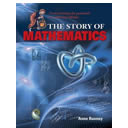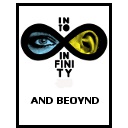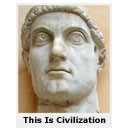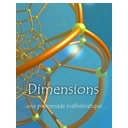The Story of Maths
 Four part series about the history of mathematics, presented by Oxford professor Marcus du Sautoy.
Four part series about the history of mathematics, presented by Oxford professor Marcus du Sautoy.
In the first episode, The Language of the Universe, after showing how fundamental mathematics is to our lives, du Sautoy explores the mathematics of ancient Egypt, Mesopotamia and Greece. In Egypt, he uncovers use of a decimal system based on ten fingers of the hand, while in former Mesopotamia he discovers that the way we tell the time today is based on the Babylonian Base 60 number system. In Greece, he looks at the contributions of some of the giants of mathematics including Plato, Euclid, Archimedes and Pythagoras, who is credited with beginning the transformation of mathematics from a tool for counting into the analytical subject we know today.
The second episode, The Genius of the East, sees du Sautoy leaving the ancient world. When ancient Greece fell into decline, mathematical progress stagnated as Europe entered the Dark Ages, but in the East mathematics reached new heights. Du Sautoy visits China and explores how maths helped build imperial China and was at the heart of such amazing feats of engineering as the Great Wall. In India, he discovers how the symbol for the number zero was invented and Indian mathematicians' understanding of the new concepts of infinity and negative numbers. In the Middle East, he looks at the invention of the new language of algebra and the spread of Eastern knowledge to the West through mathematicians such as Leonardo Fibonacci, creator of the Fibonacci Sequence.
The Frontiers of Space. By the 17th century, Europe had taken over from the Middle East as the world's powerhouse of mathematical ideas. Great strides had been made in understanding the geometry of objects fixed in time and space. The race was now on to discover the mathematics to describe objects in motion. In the third part of the series, Marcus du Sautoy explores the work of René Descartes and Pierre Fermat, whose famous Last Theorem would puzzle mathematicians for more than 350 years. He also examines Isaac Newton's development of the calculus, and goes in search of Leonard Euler, the father of topology or 'bendy geometry' and Carl Friedrich Gauss, who, at the age of 24, was responsible for inventing a new way of handling equations: modular arithmetic.
The fourth episode, To Infinity and Beyond, concludes the series. After exploring Georg Cantor's work on infinity and Henri Poincare's work on chaos theory, he looks at how mathematics was itself thrown into chaos by the discoveries of Kurt Godel, who showed that the unknowable is an integral part of maths, and Paul Cohen, who established that there were several different sorts of mathematics in which conflicting answers to the same question were possible. He concludes his journey by considering the great unsolved problems of mathematics today, including the Riemann Hypothesis, a conjecture about the distribution of prime numbers. A million dollar prize and a place in the history books await anyone who can prove Riemann's theorem.




Spotted a subtraction error in the documentary on mathematics. Irony, right?
Julia Robinson's age at her demise was not 55. 43rd or 44th minute in the final video, 'To Infinity and Beyond'.
one day when I was in the math test center of the college, there was a paper posted on the wall said, math is good because it can make people cry(something like that). it was just a joke. now this videos changed my way of viewing math. math is good cuz it's magical and fun!
Superb Documentary, must watch.
The math seems somewhat simple to follow but the documentary is all over the place. Parts were either cut or skipped so it made it hard to follow
Several portions are missing from this 26 video set. I had to watch it again on the tube where there isa posting of it in only four 1-hour videos. Great doc.
I just realized I cast a fly on the water on the other doc.
@robertallen1..This should start a thread a here. Looks like this one has been lonely. Tag, you're it.
This one won't be lonely for long. Just give me some time to organize my thoughts.
Take your time. I closing the lab and am off to supper and a little dancing with my better half.
It's interesting that 2000 years ago people didn't have a concept of negative numbers or zero, but nowadays if you ask a 3-4 year old they tell you exactly what is a debt (or negative money).
It's ironic that our "modern" society unlocked the many mysteries of nature, but still kept the majority of the population in poverty and debt.
At least 2000 years ago if you didn't have anything it meant 0. Now poverty means well below the negative scale.
Almost every country, therefore every citizen, every born child is born with a debt. And the process is speeding up. Are we proud of our achievements?
Is democratic-economic slavery the goal of all of these marvellous achievements and discoveries?
That was an inspiring series :^) I wish programs like this were around when I was in grade school.
@Sean M.
I think one of the ideas put forward is how much practical problems (i.e. commerce) steered the progress of mathematics. Only makes sense that the doc demonstrated this so often.
Indians have invented zero centuries ago not babolonians....
India & china has a long history of Maths...but almost nothing included in the documentry... indicating lack of research or west oriented documentry
............
@pallavai - he mentions a list of mathematical ideas that western mathematics discovered after eastern mathematicians and even states:
" and it says a lot about our attitude in the west to non western cultures that we nearly always claim their discoveries as our own."
Your comment degrades the quality of this documentary. This is a quality unbiased synopsis of mathematic history and ideas
try watching the second documentary :
The second episode, The Genius of the East, sees du Sautoy leaving the ancient world. When ancient Greece fell into decline, mathematical progress stagnated as Europe entered the Dark Ages, but in the East mathematics reached new heights. Du Sautoy visits China and explores how maths helped build imperial China and was at the heart of such amazing feats of engineering as the Great Wall. In India, he discovers how the symbol for the number zero was invented and Indian mathematicians’ understanding of the new concepts of infinity and negative numbers. In the Middle East, he looks at the invention of the new language of algebra and the spread of Eastern knowledge to the West through mathematicians such as Leonardo Fibonacci, creator of the Fibonacci Sequence.
@ Pallavai,
Whats the big deal! Com'on yaar...all know Indian's invented...and it is the same the documentary also acknowledge. Babylonians & others saw the void Indians defined it :-)
We are in 21st century and its time we grow from this Nationalist culture and become the Global Citizen. I believe thats the only way we can save this world...
For time being rejoice in the fact that Indians & Chinese are the guys holding the maximum amount of H1B Visa...and we all know what this visa does ... it buys wizards :-D (and that is how right now it should be...if you consider the conditions of current world)
funny world...but I am sure our other brothers & sisters from different countries will soon catch up...and I see a vision when the power of every human brain can be harnessed to do a worlds of goodness...:-)
Only problem is We need a Leader...that can direct this power to its right path...The Game is On....
@pallavai
Episode 2 is entirely about the history of Chinese and Indian mathematics (along with how that went on to influence Islamic mathematics). I guess you didn't watch that episode...
G - I assume you're American. Outside the US, mathematics is abbreviated as "maths". Only Americans abbreviate it as "math".
numbers are always numbers.. what you do with them is what your are changing.. math sounds good to me..
-an american
Good documentary, albeit a lot longer than it needs to be.
I have to comment on the video quality - whoever transcoded this is obviously inexperienced - he or she didn't even attempt a deinterlace filter, so it's painful to watch.
Also, the plural of "math" is indeed "mathematics" as used by Steve above, and not "maths".
Finally,for ALL documentaries: PUT THE YEAR OF RELEASE IN THE TITLE, i.e. "Documentary Name (2007)" - without it, we have to either reference it somewhere else, scroll to the end and read the copyright, or simply guess. WHEN a documentary is release is information that should be taken into account when viewing it, like news stories.
As Ian said, 'math' is only used in the US. And although it has an 's' on the end, 'mathematics' is not a plural. It is a singular noun.
I greatly enjoyed this documentary because it contains two subjects in which I am very interested: mathematics and world history.
I have been fortunate enough to study and use advanced mathematics throughout my career. But my love for ancient history is a new addition to my interests. For my tastes, his documentary was delicious!
'Many Thanks!
I found the videos very informative. I plan to use them in my future teaching.
Simply one of the best documentaries I have ever seen about one of the most interesting subjects around. Thank you very much for having seen it.
I watched this series and just finished it. I enjoyed it very much. Its a wonderful examination of the history of math. It looks at math as a history subject, examining math from the time when it was not fully formed, moving through time and spotlighting the great innovations that eventually became what we consider "math" today. The host also looks at some of the great figures in the history of math and explains how they came to understand and give to us their contributions to the study of math.
I think anyone who loves history will love this series. If you are a student of mathmatics you may enjoy learning a bit of the backgrounds of the various mathmatical concepts you probably already know well. If you are a young person who is interested in the study of math, this is well worth you time. It will give you an idea of the giants upon whom you will stand should you decide to study and enter the field of math.
This is a gently told story, and told well. What is great about this documentary is that its the narration that is what is important. While the images and visuals are important to a certain extent (the best visual being the wonderful way the host demonstrates how one divided by zero isn't one, but instead is infinite, and thus isn't a real equation) if you just simply listen to this while you do other things you will learn a lot. This makes viewing this on the computer absolutely perfect. I could turn this on and listen while doing other things, looking up from time to time when he was offering a demonstration. If I missed something I just went back a little and made sure I saw it.
This is great education. And entertaining too.
I just finished watching the first part (of four parts) of Prof. du Sautoy's 'The Story of Maths'. I found the documentary to be very well done. I think the computer animations were appropriate and added to the ease of following the discussion. I can not comment on the subsequent 3 parts of the documentary but I will say that the market scenes in part one led into the upcoming mathematical discussion. As an educator I appreciate that the visual breaks (i.e. the market scenes) will probably help most students to stay engaged. In math too much content without a break will often lose the average student. So I believe many viewers will benefit from the brief visual breaks. I give part one high marks, well done!
To follow up on my previous comment..You get
everything you need from the description of the
videos.
"Fermat's Last Theorem" will,give you the
"juice" you are looking for.
Thank you
"The Story of Maths",should be called,"The Story of Markets"..If I wanted to see the people,and their markets,a different video would have been
chosen.
I kept having to fast forward through the,"noise".
This could have been a really good,ninety minute
special.
Thank you